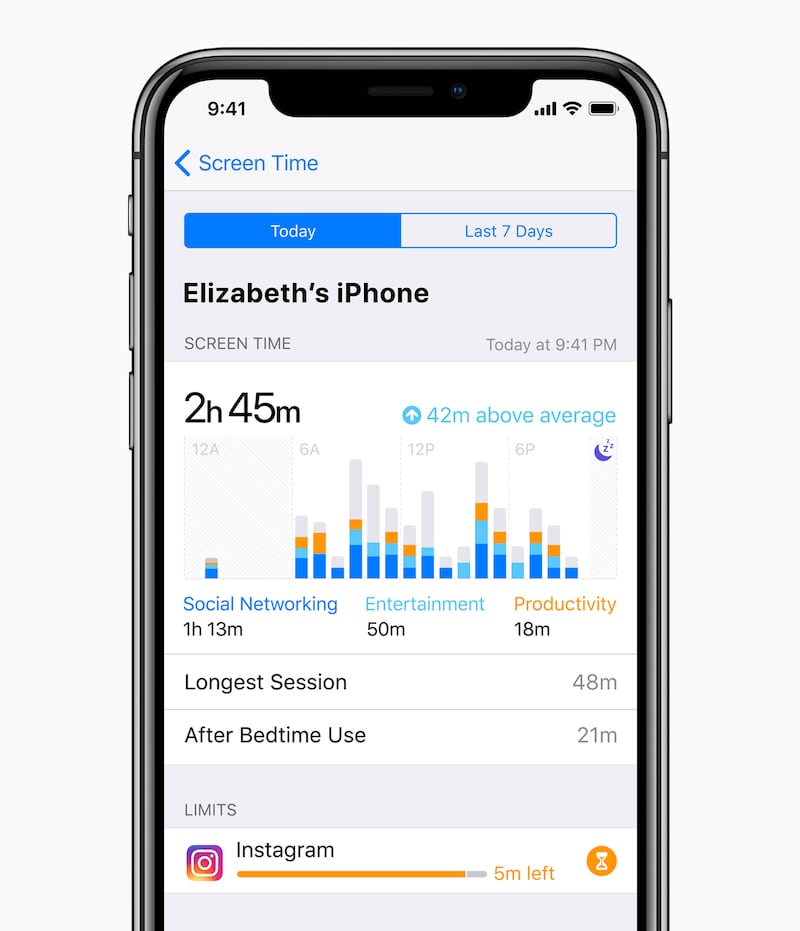On Monday, Apple announced at its annual app developer conference that its next operating system, iOS 12, would include an app, Screen Time, that would help users monitor the time they spend on various apps on their phones.
The app would feature bar charts dividing time spent on one’s phone by category type: using a productivity app, an entertainment app, or one used for social networking. The app will also send reports to the user, allow users to self-impose limits, and offer controlling mechanisms, ostensibly to help avoid time wasting: do not disturb features, controls for notifications that allow users to avoid getting them, and the ability for users to manage their screen time for themselves and their children.
“We first introduced parental controls for iPhone in 2008, and our team has worked thoughtfully over the years to add features to help parents manage their children’s content,” said Craig Federighi, Apple’s senior vice president of Software Engineering. “With Screen Time, these new tools are empowering users who want help managing their device time, and balancing the many things that are important to them.”

But will they work?
“I’ve been bombarded with calls all day today,” David Greenfield told The Daily Beast. “People want to know” whether smartphone addiction could be affected by the Screen Time app.
Greenfield is the founder of the Center for Internet and Technology Addiction and an assistant clinical professor of psychiatry at the University of Connecticut School of Medicine. “I have been writing and researching and treating issues related to internet and technology since 1998,” he said. “I wrote the second book in the world on the subject in 1999, Virtual Addiction. I am not a stranger to this topic.”
Addiction has plagued users since the dawn of the internet, Greenfield said. What’s important about Apple’s shiny new app is its quiet acknowledgement that internet and smartphone addiction is real.
That’s a big deal. For years now, internet addicts and their doctors have sought recognition of sufferers’ detrimental, compulsive need to be on the internet, affecting the same areas of the brain and inhibiting the way of life in a similar way as those with other addictions, like gambling, alcohol, food, and more. “They admitted that the technology is addictive, they’re openly saying that it is,” Greenfield said. “That’s a sea of change in the marketplace. When I wrote my book in 1999—we’re talking 20 years—it wasn’t like that. We’re talking almost 20 years” before internet (and, simultaneously, smartphone) addiction was recognized as such.
But the problem is trying to figure out how to define what internet addiction is, and how to treat it. Psychologists at Nottingham Trent University created a six-question test in March 2016 that was published in the journal Psychology of Addictive Behaviors. In 2010, a meta-analysis struggled to define whether smartphone addiction was real, primarily because the definition for it was so fuzzy, hamstrung by a lack of psychometric measures. And for years prior to that, going on a “digital detox”—living the prehistoric, non-Instagram scrolling/non-Facebook stalking/non-Twitter trolling life that so often left users bleary-eyed, induced panic, and was emotionally depriving—could help ease all those feelings and avoid wasting time.
Jean Twenge is a professor of psychology at San Diego State University whose most recent book, iGen: Why Today’s Superconnected Kids Are Growing Up Less Rebellious, More Tolerant, Less Happy—and Completely Unprepared for Adulthood, tackles the effects of smartphones on teens. Twenge agreed that Apple’s addressing of a potential epidemic of smartphone addiction head-on was important. “There’s been some debate in my viewpoint as to whether you’d call it overuse or compulsion,” she said.
But it’s certainly noteworthy that Apple is going ahead and acknowledging the existence of a smartphone/internet addiction problem and trying to institute steps to combat those issues.
Twenge helped draft a letter in January that investors sent to Apple, urging the company to fund research on what its products did to children’s brains. Twenge, who’s studied the connection between teens and their digital use since 2011, had found that there was a clear correlation between teen smartphone use and anxiety, depression, and suicide rates in research that was published in the journal Clinical Psychology.
Twenge’s thoughts on the new Apple app? “I’m pretty happy,” she told The Daily Beast. “I think that this is a wonderful and welcome step that Apple has introduced these controls. I also think it’s great that they have the controls available for both adults and children.”
Twenge works frequently with parents struggling to help their kids manage their social media presence, and she said she expected the parents would be “thrilled” about Apple’s launch of the new app. Twenge said the announcement might even compel parents to boost Apple business. “They are going to be thrilled Apple is going to give these tools,” she predicted about parents. “It might be good for business as well, since parents are going to be more comfortable buying [their products] for kids, particularly for younger kids.”
Greenfield’s primary demographic at his treatment center are children, teenagers, and adolescents. His main question? “Why did it take so long?”
That’s not to say Greenfield doesn’t think the Screen Time app is a good thing; in fact, he stresses over and over again that anything that consumers can use to be mindful of their tech use is a good step. “But is their [Apple’s] motivation pure? I would suspect not,” he said, hinting not only at sales but also perhaps wanting to get ahead of any regulations that might be coming down the pipeline.
Greenfield also said Screen Time’s simple format of tracking time leaves much to be desired. “None of that is rocket science,” he said of the notion that spending more time on the internet could lead to addictive qualities. Plus, Greenfield said, it’s not really new technology: “A lot of outside vendors make tech like this.”
But neither Twenge nor Greenfield is sure Apple’s Screen Time does all that it could have.
Twenge said a few minor things could have been added to the app’s features. “The most important thing would be for the phone to be shut down at night,” she said.
Research she’s conducted indicates that the uptick in anxiety, depression, and suicide she had found when smartphones became adopted was connected to sleep deprivation and poor sleep quality, “and we realized there was a smartphone connection,” she said. “Sleep quality is impacted by the presence of the phone and even more so if teens are staying up late and using them in the middle of the night. Even on vibrate, it disturbs sleep, and lack of sleep is a major risk factor for anxiety and depression.”
The fact that people get distracted by their compulsive need to be on the internet while driving is what worries Greenfield the most. “People die from this tech, and when people drive and compulsively use these phones, it’s dangerous,” he said.
To that end, Greenfield thinks it would be great if every time you tried to look at the home screen, you’d see a warning label banner that said something along the lines of “Do not use your phone in traffic.” As Greenfield put it: “It’s a pain in the ass to see when you pick up your phone, but if you see that 50 to 300 times a day (the number of times you pick up your phone daily), it might help.”
Greenfield and Twenge both say it might become easy for people to ignore notifications about their app usage or become numb to the time they spend. “If it’s just a reminder, is that going to be enough?” Twenge asked. “They’re just reminders, but they’re just as easy to swipe away. You can always go in and change the settings.” She also emphasized that adults and children have very different ways of dealing with their smartphones, especially neurologically.
“If you have a sugar addiction and have cookies in the house, you might eat all the cookies,” she analogized. “If you have a sugar addiction and have to go to the store to buy cookies, it’s hard to eat all the cookies.”
The one way for the app to really make an impact would be for the phone to just shut down. “The internet operates like a slot machine,” Greenfield said of why smartphones are addicting. “With notifications, they’re fairly easy to ignore unless they shut off. Shutting it off would get your attention. People ignore warnings all the time. Knowing something is dangerous doesn’t stop you from using it.”
“There’s the potential this could help, sure,” Greenfield sighed. “It’s better than nothing. But the jury is still out on whether [users] will use them or not.”







